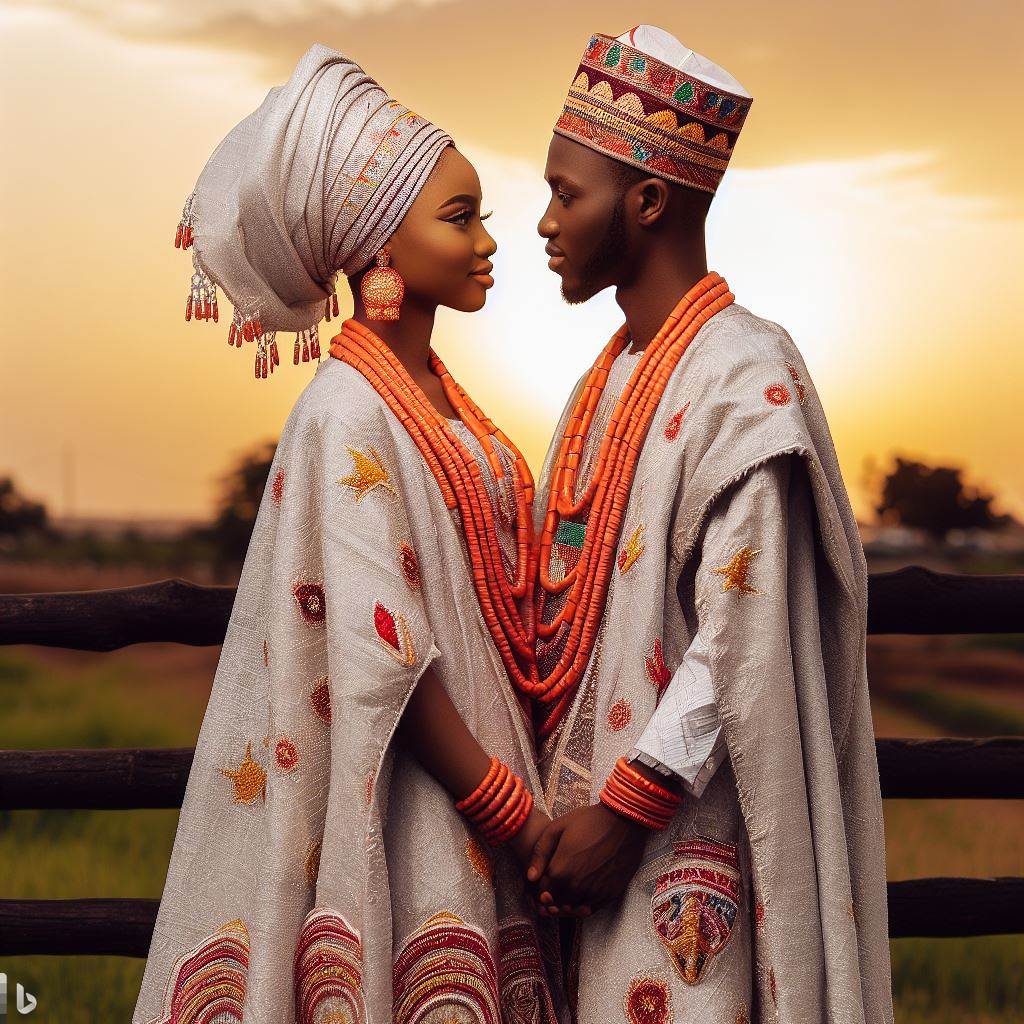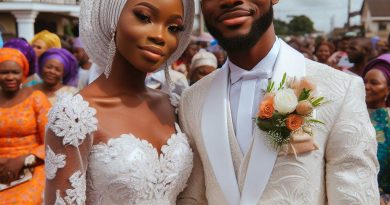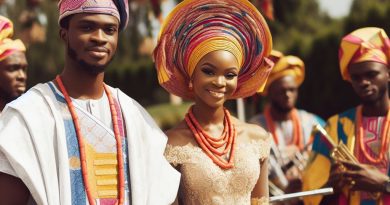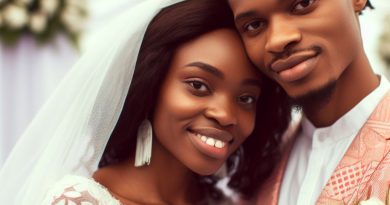Choosing the Right Outfits for Nigerian Marriage Ceremonies
Last Updated on November 8, 2023
Introduction
A. Nigerian marriage ceremonies
Nigerian marriage ceremonies are vibrant and culturally rich celebrations that showcase the diversity of the country’s traditions.
The right choice of outfits holds significant importance in these ceremonies.
It not only reflects personal style but also pays homage to the customs and values of the Nigerian culture.
B. The importance of choosing the right outfits for these ceremonies
Choosing the appropriate attire for Nigerian marriage ceremonies helps create a lasting impression and adds to the overall ambiance of the event.
It is an opportunity to showcase one’s respect for the couple and the sacredness of the union.
C. Purpose of the blog post
The purpose of this blog post is to provide guidance and inspiration for selecting the perfect outfits for Nigerian marriage ceremonies.
Whether you are a guest, a family member, or even the bride or groom, this post aims to help you make informed choices and ensure that you dress appropriately in accordance with tradition and style.
In the following sections, we will explore various dress codes and attire options for different types of Nigerian marriage ceremonies.
We will also provide tips on colors, fabrics, and accessories that align with Nigerian customs and cultural norms.
So, let’s dive into the world of Nigerian marriage ceremonies and discover the art of selecting the right outfits.
Traditional Nigerian Marriage Ceremonies
A. The significance of traditional Nigerian marriage ceremonies
Traditional Nigerian marriage ceremonies hold a great significance in Nigerian culture, representing the union of two families and the joining of two individuals in matrimony.
These ceremonies are a vital part of Nigerian customs and are celebrated with much pomp and grandeur.
B. Stages involved in these ceremonies
There are several stages involved in traditional Nigerian marriage ceremonies, each with its own rituals and customs.
Understanding these stages is crucial in order to appreciate the significance of dressing appropriately for each stage.
1. Introduction and Courtship Stage
- In this stage, the families of the bride and groom meet, and the intention to marry is formally expressed.
- This stage involves formal introductions, discussions of dowry, and the exchange of gifts.
- Dressing appropriately for this stage means wearing traditional attire that represents your culture and showcases respect for the families involved.
2. Traditional Engagement Stage
- Also known as the “Introduction” or “Knocking on the Door” ceremony, this stage involves the groom’s family paying a visit to the bride’s family to officially ask for her hand in marriage.
- This event is marked by festive celebrations, traditional music, and dance.
- Dressing appropriately for this stage requires wearing traditional attire, such as the bride wearing an “iro and buba” or “gele” (headgear) and the groom wearing a “buba” and “sokoto” or traditional agbada.
3. Traditional Wedding Stage
- The traditional wedding ceremony is the most important stage in Nigerian marriage ceremonies. It involves a series of rituals and customs performed according to cultural traditions.
- Dressing appropriately for this stage means wearing traditional outfits specific to your ethnic group.
- For example, Yoruba brides wear “aso-oke” (an intricately woven fabric) and grooms wear “agbada,” while Igbo brides wear “george wrappers” and grooms wear “isi-agu” (lion headgear and a traditional outfit).
4. White Wedding Stage
- The white wedding, influenced by Western culture, is a relatively recent addition to Nigerian marriage ceremonies.
- It is typically a Christian wedding held in a church, and the bride wears a white wedding gown while the groom wears a formal suit.
- Dressing appropriately for the white wedding stage means adhering to the formal dress code of a Western-style wedding.
C. The importance of dressing appropriately for each stage
Dressing appropriately for each stage of a traditional Nigerian marriage ceremony is important as it reflects respect for the customs and traditions of the Nigerian culture.
It also showcases the beauty and diversity of Nigerian traditional attire.
Basically, traditional Nigerian marriage ceremonies hold significant importance in Nigerian culture, encompassing various stages that are celebrated with richness and elegance.
Dressing appropriately for each stage allows individuals to honor their cultural heritage and respect the customs of their ancestors.
Remember, clothing is not just an outfit but a representation of one’s identity and heritage.
Read: Music and Dance: Essential Elements of a Nigerian Wedding
Types of Nigerian Marriage Ceremonies
A. The different types of marriage ceremonies in Nigeria (e.g., Yoruba, Igbo, Hausa, etc.)
Nigeria is a culturally diverse country with a rich heritage, and this diversity extends to its marriage ceremonies.
Each ethnic group in Nigeria has its unique customs and traditions associated with weddings.
In this section, we will explore the different types of Nigerian marriage ceremonies and the significance of wedding attire in each culture.
1. Yoruba Marriage Ceremonies
- The Yoruba people, who are predominantly found in the southwestern part of Nigeria, have a vibrant and colorful wedding tradition.
- In terms of attire, Yoruba brides often wear the “iro and buba” – a two-piece outfit consisting of a wrapper and a blouse, usually made of brightly colored fabric.
- The groom usually wears a “agbada” – a flowing gown – or a “buba” – a loose-fitting shirt – paired with “sokoto” – trousers.
- These outfits are often complemented with traditional accessories like beads and gele (headgear).
2. Igbo Marriage Ceremonies
- The Igbo people, who are located in the southeastern part of Nigeria, also have unique marriage customs.
- For their wedding attire, Igbo brides typically wear a “george” wrapper, which is a brightly colored cloth wrapped around the waist, paired with a matching blouse.
- They also adorn themselves with coral beads and a headpiece called “ichi nna.”
- The groom often wears a “isiagu” – a traditional embroidered shirt – paired with “nso oka,” which are trousers made of the same fabric.
3. Hausa Marriage Ceremonies
- The Hausa people, who are mainly found in the northern part of Nigeria, have their own unique wedding traditions.
- For Hausa weddings, brides often wear a “karkara” – a flowing gown made of colorful fabric – paired with a matching headscarf.
- The groom typically wears a “baban riga,” which is a formal attire consisting of a long gown, trousers, and a cap.
- The outfits are usually embellished with intricate embroidery and are worn with accessories like gold jewelry.
B. Unique customs and traditions associated with each type
1. Yoruba Marriage Ceremonies
One of the most well-known customs is the engagement ceremony, where the groom’s family presents gifts to the bride’s family.
This is followed by the traditional wedding ceremony, which includes rituals like the tying of the bride’s wrapper and the exchange of vows.
2. Igbo Marriage Ceremonies
One notable tradition is the “igbankwu” ceremony, which is the traditional engagement ceremony.
It involves the groom and his family visiting the bride’s family to ask for her hand in marriage.
This is followed by the traditional wedding ceremony, where the bride is officially handed over to the groom.
3. Hausa Marriage Ceremonies
One of the most significant customs is the “kayan-ziki” ceremony, where the groom’s family presents gifts to the bride’s family.
This is followed by the “walima,” which is the traditional wedding ceremony where the couple is officially married.
C. Influence of Culture and Heritage on Wedding Attire
- The choice of wedding attire in Nigerian marriage ceremonies is heavily influenced by the cultural and heritage significance attached to each ethnic group.
- The colors, fabrics, and designs used in traditional outfits are often symbolic and represent the customs and values of the community.
- Furthermore, the wedding attire serves as a way to showcase the beauty and richness of Nigerian culture.
- It is a celebration of the country’s diversity and a means of preserving and passing on these traditions to future generations.
Generally, Nigerian marriage ceremonies come in various forms, each with its customs and attire.
From the vibrant and colorful Yoruba traditions to the elegant and intricate Igbo customs, and the rich heritage of the Hausa people, these ceremonies exemplify the cultural diversity of Nigeria.
The wedding attire serves as a visual representation of these traditions, allowing couples to honor their heritage while celebrating their love.
Read: Nigerian Engagement Lists: What To Expect and Prepare
Factors to Consider When Choosing Outfits
When attending a Nigerian marriage ceremony, it is essential to select the right outfits that suit the occasion.
Several factors must be taken into account to ensure you look stylish and appropriate.
These factors include the venue, theme, and season of the wedding.
By carefully considering these aspects, you can make the best choice for your attire.
A. Importance of Considering Factors
- The venue, theme, and season of a wedding play a significant role in determining the type of outfit to wear.
- These factors set the tone and mood of the ceremony and influence the dress code for the guests.
- Ignoring them can result in inappropriate attire or feeling uncomfortable throughout the event.
B. How the Venue Dictates Style and Formality
- The venue of a Nigerian marriage ceremony can vary from traditional settings like outdoor gardens or indoor halls to modern venues like hotels or event centers.
- The chosen venue can determine the style and formality of the outfits. For instance, if the wedding takes place in a traditional setting, wearing traditional attire such as traditional Nigerian garments like agbada or gele might be appropriate.
- However, if the ceremony is in a modern venue, you can opt for more contemporary or westernized clothing.
- It is crucial to respect the cultural norms and traditions associated with the venue, as they often reflect the couple’s heritage and preferences.
- By aligning your outfit with the chosen venue, you show respect and contribute positively to the overall atmosphere of the event.
C. Tips for Selecting Appropriate and Comfortable Attire
- Research the Dress Code: Understand the dress code specified on the invitation, as Nigerian weddings often have specific expectations, such as traditional or formal attire.
- Consider the Theme: Incorporate elements of the theme or color palette into your outfit without overshadowing the couple’s attire.
- Dress for the Season: Take into account the weather and climate conditions to ensure you are comfortable and appropriately dressed.
- Choose Comfortable Fabrics: Opt for breathable and lightweight fabrics that allow you to move comfortably throughout the ceremony and reception.
- Plan for Traditional Ceremonies: If attending traditional wedding ceremonies like the engagement or the traditional marriage rites, familiarize yourself with the appropriate attire for each event.
- Mind Your Accessories: Select accessories that complement your outfit and enhance your overall look without being too extravagant or overwhelming.
- Avoid Overdressing or Underdressing: Strike a balance between looking stylish and respecting the formality of the occasion. Avoid wearing outfits that are too casual or too extravagant.
- Dress Modestly: Nigerian weddings are often family-oriented and modesty is valued. Ensure your outfit is appropriate and respectful.
- Consider Cultural Sensibilities: Understand the cultural sensitivities associated with Nigerian weddings and avoid wearing clothing that may be considered disrespectful or offensive.
By considering these factors when choosing your outfit for a Nigerian marriage ceremony, you can ensure that you are appropriately dressed and able to fully enjoy the occasion.
Remember, the right outfit will not only make you look good but also contribute positively to the overall atmosphere and celebration of love and union.
Read: Marriage Function Foods: Nigerian Wedding Delicacies

Traditional Nigerian Wedding Attire
A. The traditional wedding attire for both the bride and groom
When it comes to Nigerian marriage ceremonies, choosing the right outfits is of utmost importance.
- The traditional wedding attire for both the bride and groom holds significant cultural value and symbolism.
- In Nigerian weddings, the bride’s attire is usually an elaborate and awe-inspiring outfit that reflects her heritage and personal style.
- The fabric choices are crucial and often include vibrant colors such as red, gold, and green.
- These colors hold cultural significance, with red representing love and passion, gold symbolizing wealth and prosperity, and green representing fertility and good luck.
B. The traditional fabrics, colors, and designs commonly used
- The bride’s outfit is commonly made from traditional fabrics such as Aso Oke, a handwoven fabric, and George, a silk-like fabric with intricate embroidery.
These fabrics are crafted by skilled artisans and are known for their durability and exquisite designs. - The design of the bride’s outfit varies depending on the region and ethnic group. However, a popular choice is the “iro and buba” style, which consists of a long flowing gown and a matching wrapper tied around the waist.
Another common style is the “ankara gown,” which is a fitted dress made from vibrant Ankara fabric. - Accessories play a significant role in completing the bride’s ensemble. These can include coral beads, which are believed to bring good luck, and a traditional headpiece called a gele.
The gele is a large, intricately tied headscarf that adds elegance and grandeur to the bride’s overall look. - For the groom, traditional Nigerian wedding attire often consists of a flowing gown called a “buba” paired with loose trousers known as “sokoto.” The groom’s outfit is usually made from matching fabric to complement the bride’s attire.
- Common fabrics for the groom’s attire include Aso Oke, George, and brocade. These fabrics are often adorned with intricate embroidery and embellishments, reflecting the groom’s status and wealth.
- In addition to the buba and sokoto, the groom might also wear a matching cap called a “fila” and accessories such as agbada, a flowing robe. These accessories add regal charm to the groom’s outfit.
C. Examples and images of traditional Nigerian wedding outfits
Traditional Nigerian wedding outfits are not only worn by the bride and groom but also by other members of the wedding party.
The parents, siblings, and close relatives often wear matching outfits to showcase unity and familial bonding.
Attending a Nigerian marriage ceremony is a visual delight, as the rich colors, intricate designs, and cultural symbolism come together to create a vibrant celebration of love and tradition.
In general, choosing the right outfits for Nigerian marriage ceremonies is essential in honoring the rich cultural heritage of the country.
The traditional wedding attire for both the bride and groom, adorned with vibrant colors, intricate designs, and meaningful accessories, truly captures the essence of Nigerian weddings.
Read: An Overview of Cross-cultural Marriages in Nigeria
Modern and Fusion Wedding Attire
A. The rising popularity of modern and fusion wedding attire in Nigeria
The rising popularity of modern and fusion wedding attire in Nigeria is undeniable.
Couples are now embracing the idea of combining traditional elements with modern fashion trends, resulting in unique and stylish outfits.
B. Integrating Traditional Elements with Modern Fashion Trends
- One of the reasons behind the popularity of modern and fusion wedding attire is the desire to maintain cultural traditions while incorporating contemporary styles.
Nigerian couples are proud of their heritage and want to showcase it in a modern and fashionable way. - For instance, many brides opt for a gele, a traditional Nigerian headwrap, but instead of tying it in a traditional way, they experiment with different styles and patterns that complement their modern dresses.
This fusion allows them to honor their roots while embracing their personal style. - Grooms are also stepping up their game when it comes to wedding attire. Instead of the traditional agbada, many grooms are choosing to wear modern suits in vibrant colors or unique patterns.
This blend of traditional and contemporary fashion creates a visually stunning combination.
C. Examples of Modern and Fusion Outfits
When it comes to modern and fusion wedding attire, the options are endless.
Here are some examples of how couples are incorporating traditional fabrics with contemporary styles:
- Aso-oke Gowns: Traditional aso-oke fabric, typically used to make wrappers and headwraps, is now being used to create trendy and fashionable gowns for brides. These gowns often have modern silhouettes and exquisite embroidery.
- Agbada Dresses: Agbada, a traditional Nigerian outfit for men, has been transformed into a stylish dress for brides. With intricate embroidery and modern cuts, these agbada dresses are a perfect blend of tradition and fashion.
- Ankara Jumpsuits: Ankara, a popular African fabric, is being used to create stylish jumpsuits for brides. These jumpsuits are often combined with modern bridal accessories to create a chic and trendy look.
- Gele with Modern Dresses: As mentioned earlier, brides are experimenting with gele styles to complement their modern dresses. They may choose bold and vibrant colors or intricate patterns to add a touch of elegance to their overall look.
In short, the rising popularity of modern and fusion wedding attire in Nigeria showcases the perfect blend of tradition and fashion.
Couples are embracing their cultural heritage while incorporating contemporary styles, resulting in unique and stylish outfits that are truly one-of-a-kind.
Whether it’s aso-oke gowns, agbada dresses, or ankara jumpsuits, there are endless possibilities for couples to express their personal style on their special day.
Dos and Don’ts for Nigerian Marriage Ceremonies
A. Here are some dos and don’ts to help you make the right choices
1. Do
- Research the specific cultural norms and traditions associated with the Nigerian marriage ceremony you will be attending.
- Choose outfits that reflect the rich and vibrant Nigerian culture, such as Ankara fabrics or traditional attires.
- Opt for modest and conservative clothing that respects the traditions of the Nigerian community.
- Consider the time of the ceremony and select appropriate clothing accordingly, such as lighter fabrics for daytime events.
- Accessorize your outfit with traditional Nigerian jewelry, such as coral beads or gele headwraps, to add a touch of authenticity.
- Experiment with different color combinations and patterns to embrace the celebratory atmosphere of Nigerian weddings.
- Wear comfortable shoes that are suitable for both indoor and outdoor venues, as Nigerian marriage ceremonies often involve various activities.
- Take the opportunity to support Nigerian fashion designers by purchasing locally made outfits for the ceremony.
2. Don’t
- Wear revealing clothing that may be considered disrespectful or inappropriate within Nigerian cultural norms.
- Ignore the dress code specified on the invitation. It is crucial to adhere to the requested attire.
- Disregard the significance of head coverings. Depending on the tradition, women may be required to wear gele or other head wraps.
- Overlook the importance of coordinating your outfit with your partner or family members to create a harmonious appearance.
- Forget to consider the weather conditions and select appropriate clothing accordingly, such as bringing a shawl or jacket if needed.
- Wear excessive amounts of perfume or cologne, as some Nigerian ceremonies may take place in closed spaces with limited ventilation.
- Neglect the opportunity to learn about different Nigerian cultures and their specific dressing customs.
- Assume that all Nigerian marriage ceremonies have identical dress codes; each culture may have its own unique traditions.
B. Respecting cultural norms and traditions
Nigerian marriage ceremonies are steeped in tradition and cultural significance. It is important to respect and honor these customs when choosing your outfit.
By embracing traditional Nigerian garments and adhering to modesty guidelines, you show your appreciation for the rich cultural heritage of Nigeria.
Creativity within cultural appropriateness
While it is essential to respect cultural norms, Nigerian marriage ceremonies also offer ample room for personal style and creativity.
Ankara fabrics, for example, come in a variety of colors and patterns, allowing you to express your individuality while still adhering to traditional clothing choices.
In fact, choosing the right outfits for Nigerian marriage ceremonies requires careful consideration of cultural norms and traditions.
By following the dos and don’ts outlined above, you can ensure that your attire reflects the significance of the event while also showcasing your own unique style.
Remember, a well-chosen outfit will not only make you feel confident but also demonstrate your respect for Nigerian culture.
Conclusion
A. The significance of choosing the right outfits for Nigerian marriage ceremonies
Overall, choosing the right outfits for Nigerian marriage ceremonies holds immense significance.
It reflects cultural values, pays respect to traditions, and contributes to the overall ambiance of the event.
B. Encouraging readers to consider cultural and personal preferences when selecting wedding attire
As readers, it is essential to consider both cultural and personal preferences when selecting wedding attire.
y doing so, we not only honor the couple, but we also participate actively in the celebration of their love.
C. Positive message about celebrating diversity and showcasing Nigerian culture through fashion
- Furthermore, embracing diversity and showcasing Nigerian culture through fashion is a beautiful way to create a memorable and unique experience.
- Each outfit tells a story, symbolizes heritage, and adds an element of elegance to the occasion.
- Let us celebrate the richness of Nigerian weddings and appreciate the beauty of different traditions coming together.
- By carefully choosing our outfits, we become a part of the vibrant tapestry that makes Nigerian marriage ceremonies truly unforgettable.


